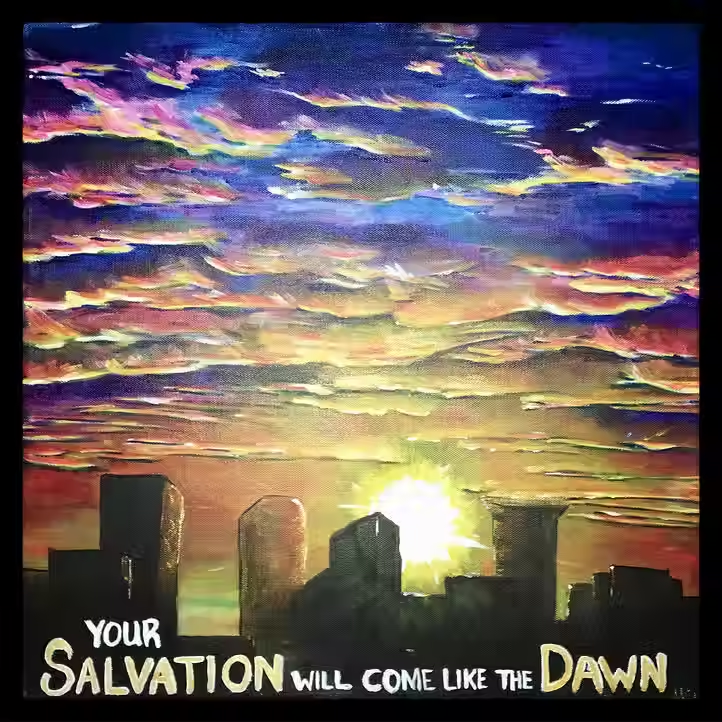Reflection for Holy Saturday
- Julie Raffety

- Apr 16, 2022
- 4 min read
By Rev. Julie Raffety
Lectionary reading for 4/16/22: Psalm 31:1-4, 15-16; Job 14:1-14 or Lamentations 3:1-9, 19-24; 1 Peter 4:1-8; Matthew 27:57-66 or John 19:38-42
Selected passage for reflection: Lamentations 3:1-9, 19-24
Read
3 I am the man who has seen affliction by the rod of the Lord’s wrath. 2 He has driven me away and made me walk in darkness rather than light; 3 indeed, he has turned his hand against me again and again, all day long.
4 He has made my skin and my flesh grow old and has broken my bones. 5 He has besieged me and surrounded me with bitterness and hardship. 6 He has made me dwell in darkness like those long dead.
7 He has walled me in so I cannot escape; he has weighed me down with chains. 8 Even when I call out or cry for help, he shuts out my prayer. 9 He has barred my way with blocks of stone; he has made my paths crooked.
19 I remember my affliction and my wandering, the bitterness and the gall. 20 I well remember them, and my soul is downcast within me. 21 Yet this I call to mind and therefore I have hope:
22 Because of the Lord’s great love we are not consumed,
for his compassions never fail.
23 They are new every morning;
great is your faithfulness.
24 I say to myself, “The Lord is my portion;
therefore I will wait for him.”
Reflect
It is quite widely acknowledged that the in between is the hardest place to be – the in between knowing something is medically wrong, but not knowing what it is (a diagnosis), struggling financially in the in between place our society labels as the unemployed, the crazy hormonal age and grade levels referred to as middle school. The Bible often refers to this in between space as a valley or a desert. A valley is a low point which translates both geographically and spiritually. A desert can be a place of beauty but its hot temperatures and arid climate more often make it a place of scarcity and death. When we are in the in-between spaces, we often feel like we are alone in a valley or a desert. These places are places of lament – where we are in deep, passionate, unresolved sadness or grief. On Holy Saturday, the disciples were in the literal in between – between Friday and Sunday – but they were in the spiritual in between too. They were in this place of unknown grief. Was Jesus truly dead? Was there reason to despair or reason to hope? What was next for these followers of Jesus who had dedicated their life to following the Son of God?
But what about Jesus? Was he in the in between too? I’m a Presbyterian minister, and it is no secret that Presbyterians are not huge fans of using language of “the devil” and a literal “hell,” (though I am proud to say there is a lot of freedom of spiritual thought in our tradition as well). And yet, the traditional Apostles’ Creed tells us that during this in between time, Jesus descended into hell. So where did that come from? By all accounts, the Apostles’ Creed draws its statement from a combination of Ephesians 4:8-10 and 1 Peter 3:18-20, but neither verse literally labels his in-between state as hell. And yet, Jesus had died an earthly death. And … spoiler alert: we know the resurrection truth of tomorrow. And so, whether you believe that Jesus descended into a literal hell or was somewhere between death and life between Friday and Sunday, Jesus is almost certainly in a literal in-between state of mortality. This perhaps the definition of the most in between a human can be.
On Good Friday as Jesus relinquishes his earthly life, he cries out to God. Even God incarnate does not go unto death easily. As much as we may want to skip ahead to the resolution of tomorrow, let us wrestle in the in between lament for this Saturday. Though many of us are tired and weary of the in-between of a global pandemic that we thought would be over by now, let us lament the in-between where we exist. Let us lament the absence of resolution for which we long for in our lives. May we join with Christ in lamenting our failure to stand with the Holy in the wrecked places of our world. May we lament and acknowledge the suffering of Jesus. As much as we may want to skip ahead, let us remain in the valley, in the desert with Christ this Saturday.
Respond
I invite you to practice lament – a passionate expression of grief and sorrow that does not require resolution - on this Holy Saturday. You can do this privately in prayer with God, in public by posting a lament on a social media platform, with family around the dinner table, or in some combination. I invite you to lament aloud using the language below.
Rest
Lord of all paths – straight and crooked, I lament [insert something in your life that you are deeply sad or in grief about]. On this Holy Saturday, I acknowledge and utter my lament in this in-between space. Amen.
About the Author

Rev. Julie Raffety is the Pastor of First Presbyterian Church in Franklin, NJ and an Associate Mathematics Teacher at Sage Alliance High School, working with kids with social and emotional diagnoses. Julie writes a monthly blog for the Presbyterian Outlook and enjoys running, snowboarding, cheering for the Green Bay Packers, and eating popcorn. She is the proud aunt to three nieces and one nephew. Studying the Bible in Lent classes is her favorite part of the Lent/Resurrection season.





Comments